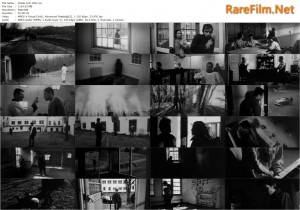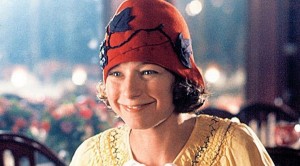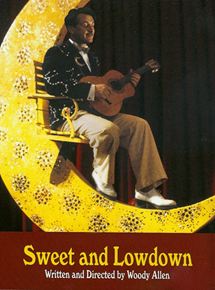From the Chicago Reader (January 15, 1999). — J.R.

An uncredited Jean-Luc Godard produced this 1997 third feature by the singular American independent Rob Tregenza (Talking to Strangers, The Arc), and along with Hungarian filmmaker Bela Tarr, Godard is certainly a presiding guru over this powerful if enigmatic view of life in and around a psychiatric hospital somewhere in rural, snowbound America. Shot by Tregenza himself (one of the best cinematographers on the planet) in black-and-white 35-millimeter ‘Scope — mainly in extremely long, choreographed takes that transpire with a minimum of dialogue but with an extremely inventive and original Dolby sound track — the film offers not so much a plot in the usual sense as a series of interlocking characters and events governed, like the film’s title, by polarities: sound and image, interior and exterior, sanity and madness, freedom and institutional captivity, society and isolation. According to clues planted in the clothes and decor (especially the cars), the action begins around 1945 and ends in the present or near future, but to confuse matters further the characters and their behavior remain unaging constants. Tregenza’s background in existential philosophy serves him well: every shot comprises an event, and most of them were shot only once, in a single take (as in Talking to Strangers), allowing change and contingency to shape the material. Read more
From the Chicago Reader (December 24, 1999). — J.R.

Apparently Woody Allen can no longer even conceive of making a movie that isn’t derived from Bergman or Fellini; this one echoes the latter’s La strada in everything from Samantha Morton’s pantomime performance as a smiling mute to the melancholic ending. (To a smaller degree Allen also imitates his own Zelig imitating Warren Beatty’s Reds, by enlisting various jazz experts, himself included, to comment on his fictional hero.) But this absorbing picture is still about as good as Allen gets, a persuasive, nuanced, and relatively graceful portrait of an egotistical yet talented jazz guitarist of the swing era, astutely played by Sean Penn, with some pretty good solos dubbed by Howard Alden and lots of unobtrusive period flavor. The jazz milieu, combined with the fact that the Penn character is obsessed with Django Reinhardt just as Allen is obsessed with Bergman and Fellini, makes this one of his more personal projects as well. With Uma Thurman, Anthony LaPaglia, Brian Markinson, Gretchen Mol, James Urbaniak, and a bit by John Waters. Pipers Alley, Wilmette. — Jonathan Rosenbaum

Read more
From the Chicago Reader (April 13, 1999):
It Happened Here
Rating *** A must see
Directed by Kevin Brownlow and Andrew Mollo
Written by Brownlow and Mollo
With Pauline Murray, Sebastian Shaw, Honor Fehrson, Rex Collett, Nicholas Moore, and Colin Jordan
Winstanley
Rating *** A must see
Directed by Kevin Brownlow
Written by Brownlow and Andrew Mollo
With Miles Halliwell, Alison Halliwell, David Bramley, Dawson France, Phil Dunn, and Terry Higgins.
By Jonathan Rosenbaum
The Music Box will be showing the only two features by English film historian Kevin Brownlow Tuesday through Thursday, April 27 through 29. Both are low-budget independent efforts in black and white, and both have been virtually lost to history because they fall outside what’s usually regarded as the history of English cinema, though their modesty makes them English to the core.
Brownlow is best known for his excellent English TV series, codirected by David Gill, about silent cinema (including Hollywood, Unknown Chaplin, Buster Keaton: A Hard Act to Follow, Harold Lloyd: The Third Genius, D.W. Griffith: Father of Film, and Cinema Europe) and for his books (including The Parade’s Gone By… and Behind the Mask of Innocence). He’ll never be remembered as a major filmmaker, because his methods of historical reconstruction are too fanatical to allow for the sort of dramatic shaping demanded of major period films. Read more



